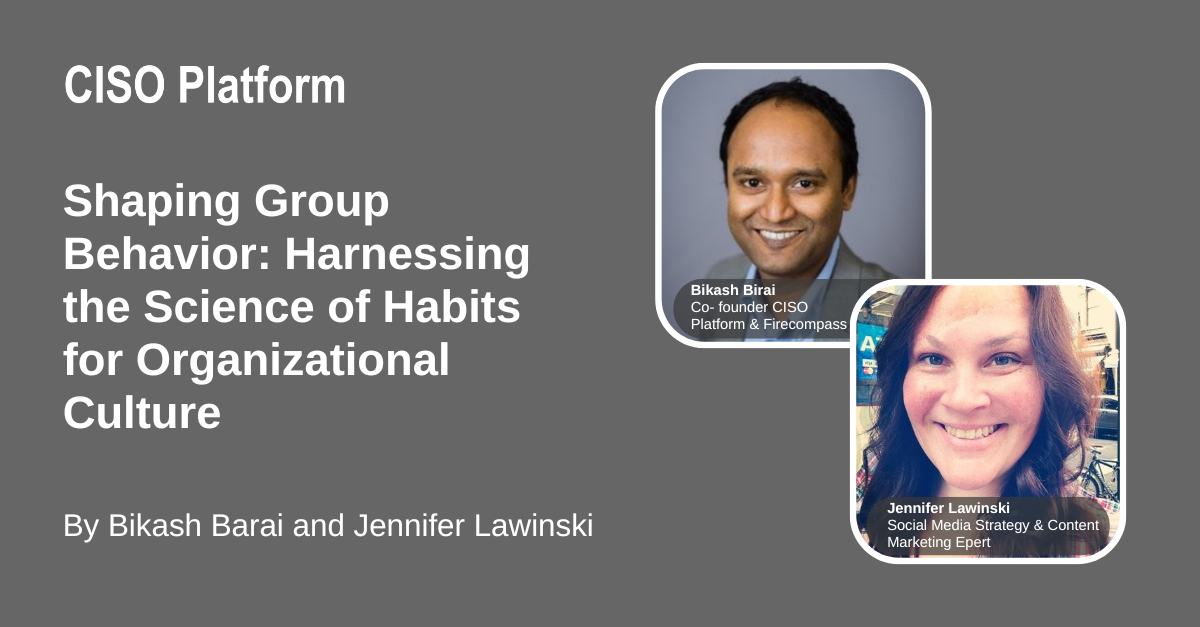Greetings, fellow cybersecurity enthusiasts! As we gather once again, this time in Singapore, it's my privilege to embark on a journey of evolution and exploration from my previous talk at RSA Conference USA. Building upon the foundation laid in the realm of individual behavior transformation, my focus now shifts towards the collective dynamics of group behavior and organizational culture. Join me as we delve into the profound implications of habits in shaping the fabric of organizational identity and resilience.
Here is the verbatim discussion:
I spoke at uh RSA Conference USA uh this year and over there my focus was more in terms of how to use the science of habits to transform an individual's behavior and then over a period of time I am now trying to work on how to extend it to a group Behavior how to form culture and when you want to influence the group Behavior and the culture of an organization you need to deal with it in a different way so the evolution from my USA talk to the Singapore talk is on how to extend the same principles but use it differently in the context of a larger group rather than an individual okay so then what are three major points you plan on making in your talk the central theme is that we are not in control even though we would love to think that we are in control but we are not and I I would explain the um the basic structure of a human habit and if you look at the kind of things which we do in our day-to-day life around 40% of the things which we do we do it unconsciously I'll give an example like um tying up the shoelace uh or driving the car changing the gear all these things we do without thinking if you think tying a shoeless is quite complex right but we.
Highlights:
The Illusion of Control: At the core of my discourse lies the sobering realization that despite our aspirations for autonomy, much of our behavior is governed by subconscious habits. Whether it's the seemingly mundane act of tying shoelaces or navigating the complexities of driving, approximately 40% of our actions occur on autopilot, devoid of conscious thought. By unraveling the fundamental structure of human habits, we gain insights into the hidden forces shaping our individual and collective behaviors.
Extending the Principles: Building upon the insights gleaned from individual behavior transformation, my talk will elucidate the nuanced strategies required to influence group behavior and cultivate a resilient organizational culture. In navigating the intricacies of group dynamics, it's essential to recognize that the principles of habit formation remain immutable, yet their application necessitates a tailored approach. From fostering collaborative workflows to instilling a shared sense of accountability, leveraging habits as catalysts for cultural change requires finesse and adaptability.
Navigating Organizational Culture: Central to my discourse is the recognition that organizational culture serves as the bedrock upon which cybersecurity resilience is built. By harnessing the science of habits, organizations can orchestrate deliberate interventions to cultivate a culture that prioritizes security and resilience. From embedding cybersecurity practices into the fabric of daily workflows to fostering a culture of continuous learning and adaptation, the possibilities for leveraging habits in shaping organizational culture are boundless.
As we embark on this journey of exploration and transformation, let us dispel the illusion of control and embrace the profound influence of habits in shaping group behavior and organizational culture. By extending the principles elucidated in my previous talk to the realm of collective dynamics, we unlock new vistas of possibility for fortifying organizational resilience against cyber threats. Together, let us harness the science of habits as a beacon guiding us towards a future where cybersecurity is not just a practice but a way of life ingrained in the very fabric of organizational culture.
Speakers:
Bikash Barai is credited for several innovations in the domain of Network Security and Anti-Spam Technologies and has multiple patents in USPTO. Fortune recognized Bikash among India’s Top 40 Business Leaders under the age of 40 (Fortune 40-under-40).Bikash is also an active speaker and has spoken at various forums like TiE, RSA Conference USA, TEDx etc.Earlier he founded iViZ an IDG Ventures-backed company that was later acquired by Cigital and now Synopsys. iViZ was the first company in the world to take Ethical Hacking (or Penetration Testing) to
the cloud.
https://twitter.com/bikashbarai1
https://www.linkedin.com/in/bikashbarai/
Jennifer Lawinski Editor-in-Chief of online engagement for RSA Conference. With experience writing for publications like CRN and CIOInsight, Jennifer has the experience to facilitate the important security conversations. Keep an eye on this space. I am excited to see what the next phase of RSAC 365 will look like.


Comments